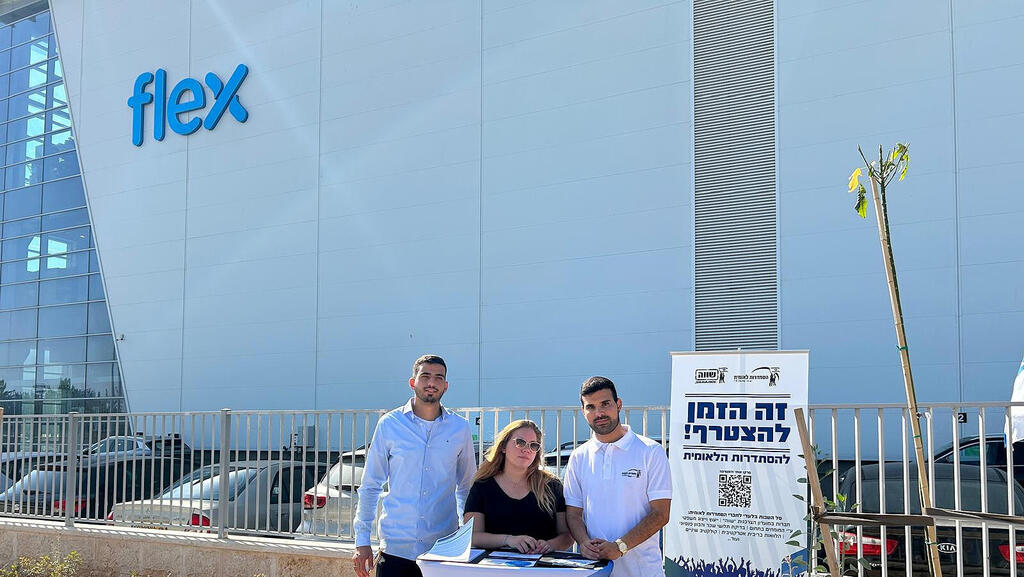
Lawsuit alleges Flex used guard surveillance, Facebook campaigns to stymie worker organization
The struggle of 3,500 Flex employees to unionize in Israel has reached the court, with a lawsuit in the amount of NIS 4 million being filed against the Israeli branch of one of the largest manufacturing companies in the world.
Flex Israel (formerly Flextronics) management is allegedly attempting to prevent its employees from unionizing under the National Labor Federation. The dispute has reached the Labor Court in Nazareth, with the National Labor Federation filing a NIS 4 million claim against Flex, accusing the company of interfering with worker organization. Flex denies these allegations.
The conflict involves the unionization of 3,500 workers. According to the lawsuit, Flex has taken extreme measures, surveilling organized workers through security personnel allegedly placed on the orders of the international parent company. The lawsuit also claims that Flex management set up a funded Facebook page to disseminate anti-union messages to employees and established an external hotline to monitor organizing employees using the company's phone database.
"Senior and mid-level managers expressed prohibited positions against organizing, in violation of the law," asserts the Federation. Flex has not yet responded to the lawsuit in court but previously argued that the National Labor Federation is acting in bad faith, unfairly using Flex's name to promote unionization. Flex is requesting that the court prohibit the Federation from contacting workers using unauthorized phone numbers or postal addresses and to cease announcing workers' union membership before the union is officially recognized.
In early July, the National Labor Federation announced that 3,500 Flex employees had joined the union, meaning all negotiations over wage increases, bonuses, and welfare conditions would be conducted by the union committee with the company's management. Flex, a large U.S.-based company with global operations, quickly responded: "Contrary to the Federation's position and announcement, there is no worker organization in the company. This is an attempt to establish facts on the ground and improperly influence the company's employees. We believe that our employees will make the right decisions of their own free will."
High-tech companies are typically characterized by an individual approach to employment, with most lacking employee unions. Unionization is often seen as incompatible with an industry that relies on talent and personal contracts. However, Flex differs in that it employs production workers with relatively low wages. Although Flex operates in the high-tech sector, it primarily focuses on manufacturing rather than development. Flex Israel is a large employer, with approximately 4,000 employees. It serves as a major contractor for electronic production services, manufacturing various components for large companies worldwide, including 3D printer parts and components for the medical and automotive markets. Flex Israel operates in four locations: Ofakim, Modi'in, Migdal HaEmek, and Haifa. Flex Global is a publicly traded company employing around 172,000 people globally, with 100 factories in 30 countries.
The court's discussion of this case is significant for the Israeli labor market, with implications for other employers who might act against unionization efforts in their workplaces. Flex Israel has openly expressed its opposition to unionization, reflecting the stance of the company's global management. This is despite a court ruling about ten years ago regarding the unionization of Pelephone employees, which established that employers cannot interfere with unionization efforts, pressure employees not to unionize, or include clauses in employment contracts that prohibit unionization.
3 View gallery


The National Labor Federation reps next to the Flex Israel plant
(Photo: National Labor Federation)
The lawsuit file contains photographs and videos showing security guards next to Flex employees, images of the Facebook page that was created, and posts targeted at Flex employees that management shared or liked in support of opposing unionization.
"The workers' organization is not interested in legal proceedings. It is the employer who instills fear to send a clear message to workers about their opposition, to scare them, and to hinder unionization," the lawsuit states. "Flex disregards law and order, focusing instead on controlling and intimidating its employees, radically violating all the rules concerning employer interference, and directing its senior and junior managers to oppose the move while refusing to accept any threat to the workers' representatives," according to the lawsuit.
The lawsuit claims damages of approximately NIS 220,000 for the main damage clauses and around NIS 900,000 for setting up the Facebook page and publishing four posts against the National Labor Federation targeted at Flex employees. The total scope of the lawsuit is, as mentioned, NIS 4 million.
The unionization effort began about three months ago when a group of Flex employees approached the National Labor Federation seeking to unionize through it. The workers mentioned that in the past, the General Federation of Labor in Israel had attempted to unionize them, but the effort failed due to the company's opposition. On July 9, representatives of the National Labor Federation stood outside the factory gates in Modi'in, Ofakim, and Migdal HaEmek, signing up workers as they arrived for work. Simultaneously, the Federation sent a letter to Flex management notifying them of the unionization effort and requesting permission to enter the factory to answer workers' questions. Flex claimed that the demonstration outside the factory gates was not coordinated with them.
Unionizing employees requires the signatures of one-third of the company's workforce. The process becomes public when the target number of signatures seems attainable. According to the lawsuit, once open activity began on July 9, management, through senior and junior managers, allegedly began attempts to thwart the organization. A company security officer began videotaping the Federation representatives, and when the company’s CEO, Zafrir Gabay, arrived at the factory, he informed the Federation members that they were breaking the law. Later, a company employee informed the Federation representatives that workers had received a WhatsApp message from Flex stating that the unionization effort was propaganda and advising them not to respond to calls on the matter.
The Federation presented to the court a message sent by a plant manager in an internal WhatsApp group to mid-level managers, stating: "Talk to the workers, this is the worst move for the plant. As soon as something like this is established, Flex Israel will relocate to other sites immediately." Flex admitted that such a message was sent but claimed that the incident was not known to higher management. The company condemned the message, and the manager was called for a clarification meeting, with clear instructions issued to all managers not to interfere with the unionization effort.
Flex management claimed that Federation representatives had misled employees into believing they were acting on behalf of Flex management and that the Federation had used the company's phone database. It is also alleged that employees complained to the company about being harassed by the Federation.
After a court hearing before the lawsuit was filed, Flex management agreed to allow Federation representatives to enter the factory, but they refused to let them stay in the cafeteria where workers gather during breaks. Under the agreement, the representatives were allowed to stand in the shuttle plaza, but according to the Federation, the company placed them in the lobby while the workers were leaving the factory on shuttles. In a defense letter, Flex denied the allegations.
The mutual accusations continued in the following days, with each party trying to influence the employees. The lawsuit, filed by lawyers Ravit Keren Rozen, Betty Metzer Levi, and Ran Confino, quotes Barak Yanir, the retiring CEO of the Migdal HaEmek plant, speaking before groups of workers before his departure from the company: "A workers' committee will destroy Flex and the work structure that exists here." The Federation also claims that from the outset, management communicated to workers that unionization would harm Flex and lead to factory closures and relocation of activities from Israel to other sites.
Flex responded by claiming that the National Labor Federation's accusations of interference in unionization are baseless and that Flex's conduct was fair and objective. "The Federation acted in blatant bad faith, aggressively, thuggishly, and illegitimately, using improper measures that harm the workers." Flex presented to the court employee testimonies about harassment from the Federation, including representatives who allegedly identified themselves as Flex employees. Flex asserts that it instructed its managers to allow the Federation to conduct outreach activities and that the security company employee approached the Federation members outside the factory gates as part of his duties, since they appeared without prior coordination, and at no point did he interfere with their work.















